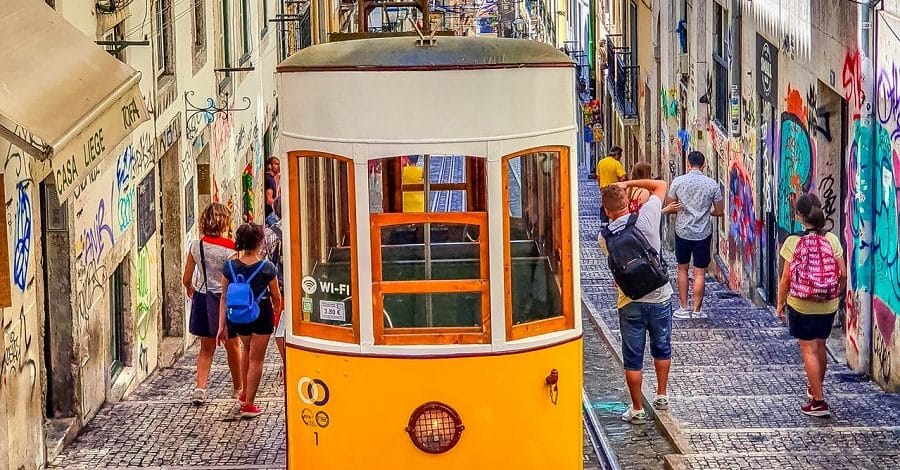Portugal has become a top destination to live in. Increasingly more people from the United States and around the world are flocking to this beautiful country because of its wonderful climate, affordable living costs, friendly people, and great Western culture.
If you’re considering moving to Portugal permanently, there are a few steps to follow to ensure you comply with the current Portuguese immigration laws. For some, the process may seem overwhelming at first, but compared to many other countries, Portugal’s immigration process is fairly straightforward, thanks to their welcoming policies for foreign newcomers. If done right, it can be an effortless experience. Let’s explore the basics of this process, understand the different types of visas and what it takes to acquire Portuguese citizenship:
Portugal visa types and requirements
Before moving to Portugal, the first step is to find out whether you need a visa to enter and stay in the country. Immigration rules may differ depending on your nationality and the length and purpose of your stay in Portugal. Once you’ve determined that you require one, you need to confirm the right type of visa for your unique situation. There are three main categories of Portuguese visas:
Short-stay visas
These visas are also known as Schengen visas. They are for stays of up to 90 days and are mostly applied for by tourists. Because the United States is one of Europe’s visa-exempt countries, American citizens do not need a visa to visit the Schengen Area for up to 90 days.
Temporary-stay national visas
These visas allow you to stay in Portugal for up to one year. They permit multiple entries, meaning you can leave the country for short periods. These visas are ideal for temporary work or study purposes. Visa applications for temporary-stay visas are submitted at the US Portugal Embassy or your local Consulate.
Long-stay national visas
These visas are also known as residency visas, and they are for stays of longer than one year. Most people who are planning on living in Portugal apply for these visas. Once you’ve received a long-stay visa, you must apply for a Portuguese residency permit from the Immigration Service (SEF) of Portugal.

What do you need to apply for a long-stay visa?
The following is a list of the minimum documents required to apply for a long-stay visa:
- Official application form
- Valid ID or passport
- Two passport photos
- Proof of sufficient medical insurance for at least up to four months
- Access to criminal records by the Portugal immigration authorities
- Proof of accommodation for up to one year
- Proof of income to support yourself for the duration of your stay
- Numero de Identificacao Fiscal (NIF)
Note: The NIF or taxpayer number allows the identification of residents or citizens before the Tax Authority (AT).
What type of long-stay Portuguese visa should you apply for?
There are typically three types of long-stay visas people apply for: D7 Visa, D2 Visa and the Golden Visa.
The D7 visa is also known as the passive income visa. Ideal for retirees, this visa is also suitable for some remote workers. To be eligible for the Portugal D7 visa, there is a minimum income requirement for the main applicant, as well as their spouse and children. With this visa, you need to spend at least 16 months in the country during the first two years.
The D2 visa enables entrepreneurs and independent service providers to live and work in Portugal. This visa was started by the Portuguese government to raise external resources and investments to grow the economy. This visa is suitable for non-EU citizens who want to start a business or move an existing business to Portugal.
The Portuguese Golden Visa program is a residency by investment scheme designed specifically for non-EU citizens. To qualify, an investment has to be made. Different investment options include:
- Real estate worth more than €500,000
- A minimum capital transfer of €1.5 million to Portugal
- A minimum fund subscription of €500,000 in a qualifying Portuguese fund
How to get residency in Portugal
Once the suitable visa has been issued, the next step is to apply for a residency permit in Portugal. Residence permits allow foreign citizens, including American citizens to legally live in Portugal.
During this step, an interview is scheduled with the Immigration and Borders Service (SEF). At this interview, the applicant must present all the necessary documents required to obtain a residency card. These documents may include:
- Official form
- Two recent photographs in color
- Passport
- Valid visa
- Evidence of sufficient means of subsistence
- Evidence of adequate accommodation
- Permission for SEF to check Portuguese criminal record
- Numero de Identificacao Fiscal
Once everything is in accordance to the law, the applicant’s biometric data is collected for the issuance of the residence card. Permanent residence is available after five years of residence in Portugal.

How to obtain Portuguese citizenship
Those who want to live in Portugal permanently can apply for citizenship available after six years of residency in Portugal, or three years if applying for citizenship by marriage. The benefits of Portuguese citizenship include:
- Voting in Portuguese elections
- Obtaining a Portuguese passport
- Acquiring EU citizenship
- Living or retiring in other EU member states
Residents must apply for citizenship at the Portuguese Ministry of Justice or Instituto dos Registos e do Notoriado. Requirements include:
- Sufficient knowledge of the Portuguese language. This can be proven through certification or a test.
- Not being convicted of any crime that is punishable by a sentence of three or more years.
Required documentation to apply for Portuguese citizenship includes:
- A valid birth certificate
- Proof of sufficient knowledge of the Portuguese language
- Passport
- Residence permit
- Details of birth, occupation, and current residence
- List of countries previously resided in
- Criminal record certificate
- Documentation from SEF proving legal residency in the country for at least six years

Deciding to move to a different country is never easy. There are many logistic and legal aspects to consider. The application process to live in another country is also often so overwhelming that many give up halfway.
Luckily, the process of moving to Portugal from the US and applying for a Portuguese visa and residency permit is much easier compared to many other countries. If you do sufficient research, obtain good information from official sources, organize your documents correctly and get the right advice, the process can be smooth and simple. Keep in mind that rules and regulations for immigrating to Portugal may change from time to time, new immigration programs and opportunities may arise, so always stay up to date with the latest information to make the process as smooth and efficient as possible.

